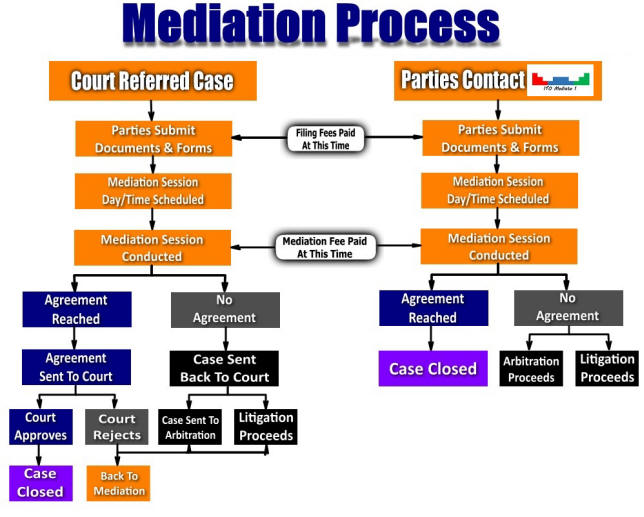|
| |
|
About Mediation
 |
·
What is Mediation?
Mediation is a process in which people, organizations or
businesses in dispute are assisted by a Mediator to assist them
to reach an agreement which settles the dispute. Mediation
encourages negotiation in a non-threatening environment.
|
 |
·
Mediation and the Legal profession ... how are they different?
There
are two teams of lawyers: one representing the person who
initiated the prooceedings; the Complainant, and the person
defending the case, the Defendant.
From the outset, the
lawyers mostly adopt an aggressive position in representing
their clients in the case.
As a consequence of adopting
that stance, the lawyers of each side generally widen the
dispute as they seek as many additional arguments and
accusations against the other side as is possible.
That
means that even simple matters become complicated quite
unnecessarily and the clients find themselves in an evermore
entangled expensive legal battle.
In contrast, the
process of mediation, instead of widening the dispute tends to
narrow it by encouraging clients to concentrate on the key
issues and focus on finding a mutually acceptable resolution.
Another difference is the rate of progress of the matter. In
mediation, there is an emphasis upon reaching agreement in as
short a period as possible. Providing the parties co-operate in
that endeavour, the matter can be dealt with efficiently which
of course means that the cost of resolving it can be a tiny
fraction of a legal proceeding. |
 |
·
Does the Mediator take a neutral position?
Yes. A good mediator does not sit in judgement and favours
neither party. His or her objective is to help the parties
discover ways of securing an agreement. Certainly, the mediator
can, in private, discuss with each party, the logic of the
position each person is taking which may assist people to see
the dispute more objectively. The mediator will not push people
into reaching agreement, but will promote the concept of
reaching a harmonious outcome. |
 |
·
If negotiations are successful through mediation, what is the
next step?
The mediator can prepare a settlement agreement document for
both parties to sign. Usually the mediator recommends that the
parties take legal advice on the wording of the document to
ensure it represents the detail of the agreement accurately.
|
 |
·
What if no agreement is secured through the application of
mediation?
Sometimes there are just some items upon which the parties can
agree. Even if that leaves other items of disagreement, the
matters of agreement should be documented because if the parties
subsequently choose to litigate (use the Courts), then at least
the matter’s complication has been reduced and the litigation
then should be less expensive.
Without agreement through
mediation, there are commonly two options: 1. To use the legal
system and commence proceedings or 2. To leave the matter
unresolved and do nothing. Neither option is usually very
attractive and hence the great value of the parties trying to
reach agreement in a spirit of goodwill through the use of
mediation. |
 |
·
What is the cost of mediation services?
Because the parties share the cost of mediation 50/50, the cost
is vastly lower than litigation,. Secondly, because the
mediation process narrows the dispute, the amount of time
involved is far less and hence the cost is proportionately less.
The mediator charges an hourly fee and that fee varies
depending upon the experience and skill of the mediator and
whether specialized knowledge is required.
However, the
bottom line is that mediation is the least expensive method of
resolving a dispute and hence is highly valued by most people
who have experienced its unique opportunities and qualities.
|
 |
·
Why is mediation an intelligent approach to settling disputes?
For business, there is nothing more destructive than disputes.
Left to fester, a dispute can bring growing resentment, bad
publicity and frequent distractions. For personal disputes,
mediation reveals opportunities for renewing relationships or at
the least the reduction or elimination of harbored feelings of
ill will.
And of course, the saving of money. Many
people’s life’s savings can be lost through expensive legal
proceedings, far greater than had ever been imagined at the
outset.
Mediation just makes sense.
Using
mediation in the workplace - for example, to resolve employee
disputes.
Never has there been a time when it has been so
important to stop bullying in the workplace. Owners, managers,
and supervisors are, or will be under a legal obligation to take
appropriate steps to protect people in the workplace from the
torment of bullying. It has become a criminal offence and people
found guilty of bullying or ignoring bullying may receive prison
sentences.
Mediation can be an ideal remedy for employee
disputes. Business enterprises and organizations should have
mediation facilities available (via independent mediation firms)
for use by its employees and explained in employee handbooks,
procedure manuals and codes of conduct.
|
 |
|